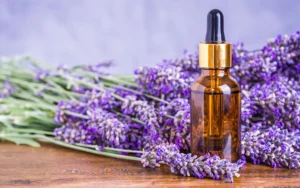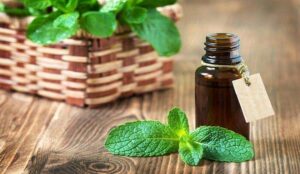Using essential oils for hair care is a popular trend in the beauty world. However, not all essential oils are good for hair. The article below will introduce some essential oils that help improve the strength and shine of hair.
1. Which essential oils are good for hair?
Essential oils are substances extracted from plants through methods such as distillation or evaporation. While essential oils are most famous for their aromatic properties, they also have health-beneficial properties. One benefit that some essential oils provide is improved hair health. Oils can help hair grow, adding strength and shine to hair. Choosing essential oils for hair is actually not too complicated. Each essential oil will help fix specific hair problems, you can rely on their uses to choose the right essential oil for your hair. Here are some essential oils that help improve hair effectively:
Lavender oil


Lavender essential oil can help speed up hair growth. It also has antibacterial properties and can improve scalp health. Mix a few drops of lavender oil with 3 tablespoons of a carrier oil, such as olive oil or melted coconut oil, then apply directly to the scalp. Leave it on for about 10 minutes before rinsing it off and shampooing your hair as usual. You can do it several times per week.
Menthol


Peppermint essential oil can cause a cold, tingling sensation by increasing blood circulation to the area where it is applied. Conditioning your hair with peppermint essential oil can help promote hair growth. One study found that peppermint essential oil, when used on mice, helped increase the number of hair follicles, follicle depth, and overall hair growth. Mix 2 drops of peppermint essential oil with maize oil, then massage your scalp and leave for 5 minutes before rinsing with shampoo.
Rosemary essential oil
If you are looking to improve hair thickness and hair growth, rosemary essential oil is a great choice due to its ability to effectively improve cell turnover. According to one study, rosemary oil works as well as minoxidil, a popular hair growth treatment, but causes less itchy scalp as a side effect. Mix a few drops of rosemary essential oil with olive oil or coconut oil, then apply the mixture to your scalp. Leave it on for at least 10 minutes before washing it off with shampoo. Should be done twice a week for best results.
Cedarwood essential oil
If you are wondering which essential oil to choose for your hair, consider cedarwood essential oil. Cedarwood essential oil is said to promote hair growth and reduce hair loss by balancing oil-producing glands in the scalp. It also has great antifungal and antibacterial properties, which can treat conditions that cause dandruff or hair loss. You should mix a few drops of cedarwood essential oil with 2 tablespoons of carrier oil, then massage the mixture into your scalp and leave it for 10 minutes before rinsing.
Lemongrass essential oil
Lemongrass essential oil is an effective dandruff treatment. A 2015 study found that lemongrass essential oil significantly reduced dandruff after one week of use. Lemongrass essential oil treats dandruff most effectively when used every day. You should mix a few drops of lemongrass essential oil into shampoo or conditioner and use daily.
Thyme essential oil
Thyme can help promote hair growth by stimulating the scalp and actively preventing hair loss. Like cedarwood essential oil, thyme essential oil is also considered useful in treating alopecia areata. However, you should only add 2 small drops to 2 tablespoons of carrier oil before applying it to your scalp. Leave it on for about 10 minutes, then rinse.
Sage essential oil
Sage essential oil contains linalyl acetate which is effective in hair growth. It can improve hair strength, and also helps speed up hair growth, making it harder for hair to break and fall. Mix 3 drops of sage oil with your favorite conditioner or with 1 tablespoon of carrier oil. If you use it daily, leave it on your scalp for 2 minutes. If you only use it once or twice a week, leave it on for 10 minutes.
Tea essential oil
Tea tree essential oil has powerful cleansing and antibacterial properties. When used topically, it can help speed up hair growth. Tea tree oil comes in many concentrations, so it is important to follow the manufacturer’s instructions. A 2013 study even found that a mixture of tea tree oil and minoxidil was more effective than minoxidil alone at improving hair growth, although more research is needed. You can mix 10 drops of tea tree essential oil into shampoo or conditioner and use daily. Or simply mix 3 drops of tea tree essential oil with 2 tablespoons of carrier oil and let sit for 15 minutes before rinsing.
Ylang ylang essential oil
Ylang ylang essential oil is great for people with dry scalps, as it can stimulate sebum production. Since lack of oil and sebum causes hair to become dry and brittle, ylang ylang essential oil can help improve hair texture and reduce breakage. Mix 5 drops of ylang ylang essential oil with 2 tablespoons of warm oil. Massage the mixture into your scalp and wrap with a warm towel. Leave it on for 30 minutes before rinsing. Ylang ylang essential oil can also be found in preparations such as shampoos or creams.
Chamomile essential oil
Chamomile essential oil has both anti-inflammatory and anti-fungal properties, making it ideal for treating dandruff and scalp irritation. Chamomile essential oil has a calming effect, which can also help reduce stress that can lead to hair loss. Add a few drops of chamomile oil to your shampoo or conditioner or massage it directly into your scalp.
Horsetail oil
Horsetail oil is actually an extracted oil, not an essential oil. It contains silica, which improves hair growth and strength along with reducing dandruff. Although there are no studies evaluating the effects of horsetail oil when applied topically, a 2015 study found that horsetail oil pills improved hair growth and strength in women with curly hair. thin. It may also be effective as a topical treatment, as some evidence suggests that it may help increase blood flow to the scalp and have similar benefits to pills.
2. Risks and complications of essential oils
The biggest risk of essential oils is skin irritation or allergic reactions. This is especially common when applying undiluted essential oils directly to the skin. Allergic reactions are also more common in people with sensitive skin or those who are allergic to essential oils. To gauge the level of irritation, be sure to test a small amount of the mixture on a small area of skin before use. Symptoms of skin irritation include: contact dermatitis, burning, discomfort or tingling, redness in the affected area. Signs of an allergic reaction include: severe dermatitis, blistering rash, difficulty breathing, swollen tongue or throat.
In fact, hair conditioning with essential oils is only suitable for adults. Therefore, if you want to use essential oils for children, ask your doctor first to ensure safety and avoid allergic side effects.
In short, essential oils can help improve hair health and have a low risk of side effects, are cheap and easy to use. You can mix a little essential oil with carrier oil or shampoo and apply it to your scalp regularly to increase hair growth, strength, and shine.
Source: healthline.com


